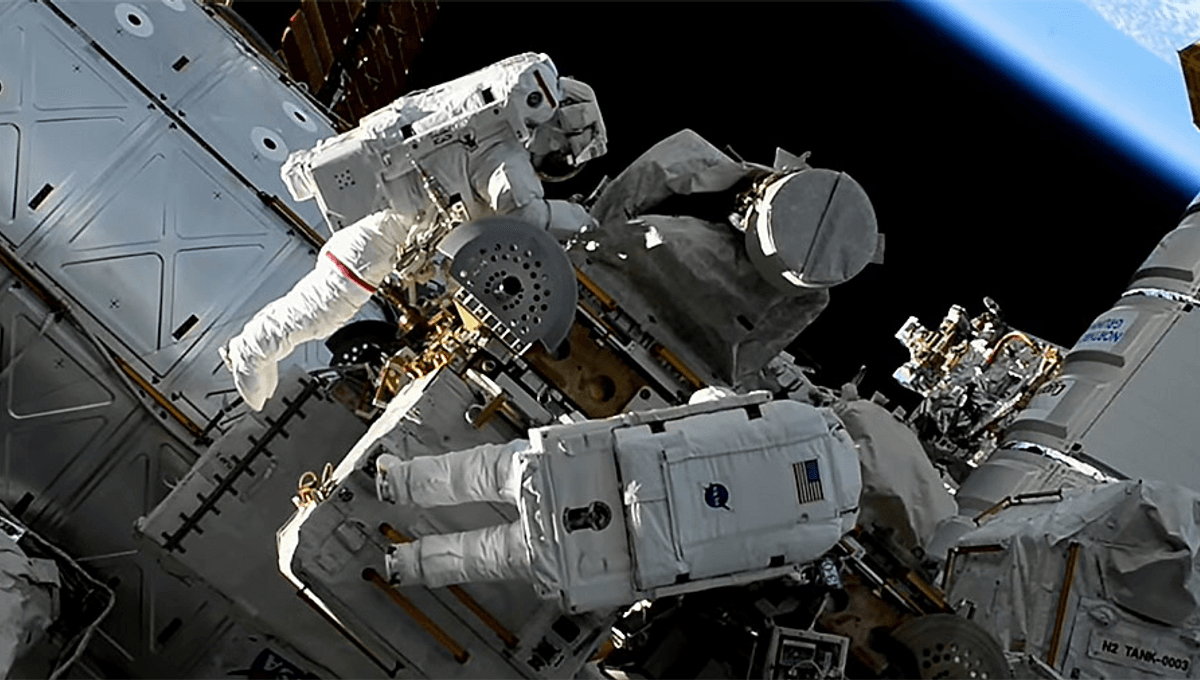
We’ve all been there; you’re fixing some tricky object and you drop one of the tools you brought that isn’t currently in use. Sometimes it’s the whole tool bag. For most of us, however, the main danger is gravity causing it to land forcibly on a toe. Things are trickier if you’re in microgravity, and more awkward when thousands of people worldwide are watching on livestream.
This, alas, was the fate of Jasmin Moghbeli and Loral O’Hara, who were on a mission outside the International Space Station (ISS) on November 1. The two astronauts were not the first to drop objects in orbit, and almost certainly they won’t be the last, but they would probably have preferred to have bruised feet, at least until the lost toolkit’s orbit was calculated.
The astronauts were suited up and outside the ISS while trying to replace a malfunctioning trundle bearing assembly that’s part of the station’s solar array. Solar panels in space don’t need to worry about clouds or atmospheric interference, and the nights are short, but the need to point at the Sun is just as crucial as on Earth, and considerably more difficult.
The trundle bearing is one of 12 on the ISS’s port solar alpha rotary joint that keeps the panels tracking the Sun. While working on its replacement, one of the astronauts dropped a tool bag. NASA has politely avoided naming which astronaut was responsible.
Fortunately, none of the lost tools were needed for the rest of the mission, and the ISS blog reports: “Mission Control told the station crew that the solar array is functioning well after the bearing replacement.”
Every item lost in a low Earth orbit becomes a potential hazard should it encounter something moving on an orbit different enough that they have high relative velocities. Cameras picked up the bag as it moved away from the ISS, and Mission Control’s analysis of its path indicated the threat was slight enough to require no action. That’s not really surprising – one tool bag is a lot less likely to cause damage than the pieces of a blown-up satellite, particularly since, unlike the satellite debris, no force was imparted to the bag. The bag has even entered the catalog of known artificial objects in space (58229 / 1998-067WC if you must know).
It might seem hard to drop something in microgravity. After all, it starts with an almost identical orbit to the space station and the astronaut themself. Gravity acts on all of them the same way, so it’s not like an object dropped by a worker on a high platform accelerating rapidly away. However, spacesuits have a long way to go for ease of operation, and spacewalks are exhausting. As the Apollo 17 crew noted, even on the surface of the Moon, the combination makes for plenty of fumbles, and it’s all too easy to give an object you’ve just let go of a push in the wrong direction.
At least half a dozen items have been dropped during spacewalks, perhaps most famously a spatula in 2006.
Fortunately, there is a tiny amount of atmospheric drag at the height of the ISS, and objects that slip out of astronauts’ hands often end up on orbits that take them to lower altitudes, and therefore greater drag, for at least part of the journey. Consequently, the space spatula spiraled down and burned up over the Atlantic four months later and most dropped items have the same fate.
Hopefully something similar will happen to the tool bag, rather than colliding with a satellite. If you’re wondering why people aren’t more worried about dropped items like this, it’s because there are believed to be more than 100,000 pieces of satellite and other human-made debris in space. Something needs to be particularly large, or traveling on an identifiably dangerous orbit, to stand out.
Moghbeli and O’Hara were also able to shift a cable that was affecting one of the ISS’s external cameras and prepare conditions for a future roll-out solar array to be installed. However, additional plans to remove a communications box during the spacewalk were deferred to another time.
Source Link: Astronauts Accidentally Drop Tool Bag While On Repair Job During Spacewalk